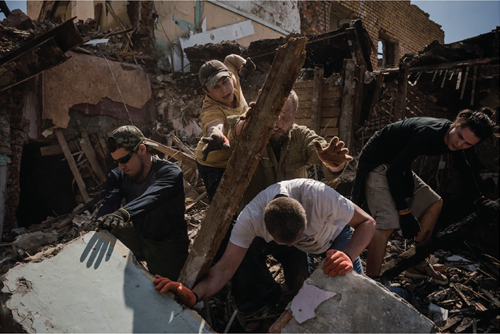Insight
Managing complexity: lessons from project management in Ukraine

NIRAS Sweden invited authorities and partners to a meeting to share experiences and lessons learned from ongoing projects in Ukraine.
Insight
NIRAS Sweden invited authorities and partners to a meeting to share experiences and lessons learned from ongoing projects in Ukraine.
Navigating project management in Ukraine presents unique challenges. With a volatile context shaped by conflict, high staff turnover, and unpredictable regulations, delivering impactful development projects requires resilience, creativity, and adaptability. At a recent seminar, NIRAS shared insights from two ongoing initiatives in Ukraine: the EU-funded EU4SmallFarms project and the Swiss-Ukrainian Ukraine’s Cohesion and Regional Development (UCORD) project. These reflections, drawn from the experiences of project leaders Anastasiia Yermoshenko (UCORD) and Kristina Mastroianni (EU4SmallFarms), offer a roadmap for managing complexity in high-risk environments.
The experiences of EU4SmallFarms and UCORD offer valuable lessons for managing projects in high-risk contexts:
Building resilient project teams
There is a lot of money in circulation in support of Ukraine, which leads to budgets for projects in Ukraine being maximised and the number of procurements minimised so as not to detract from the important work. Effective project management starts with well-structured teams and clearly defined roles. For both EU4SmallFarms and UCORD, this foundation has been critical to maintaining operations amid uncertainty.
EU4SmallFarms engages a lot of experts and the biggest challenge is to keep track of so many experts and so many activities. The team spans multiple locations, with a strong local presence in Kyiv supported by Swedish-based staff. “EU projects follow clear templates and processes, so it is key to have a project manager and Team Leader (TL) who are comfortable with all these formal processes. It is also important to have a TL you can trust and ours has extensive experience in Ukraine and a strong team in place around him,” explains Kristina. “A good relationship with the client – the EU Delegation – is important to ensure that we have the same goals, which can change quickly in situations like this. We have weekly check-in meetings. We also rely on robust digital systems, from platforms like TEAMS and Zoom to electronic signatures, which streamline workflows and enable remote coordination.”

Meanwhile, the UCORD team prioritises staff accountability and leadership. “Our Team Leader has operational responsibility while NIRAS is responsible for overall implementation of the contract and project as a whole. In the end, it is NIRAS that bears all the risks. We see that clear leadership and staff accountability are essential to UCORD success and make it a point to have regular check-ins with staff to ensure their well-being. Everyone adapts during the war, but how do they really feel? We offer psychological support to the project staff if needed, says Anastasiia. Finding and mobilising resources, especially local long-term experts, takes a lot of time. The project also employs creative recruitment strategies, tapping into local networks and hiring young graduates to address talent gaps. In addition, the team is in close contact with the donor, represented by the Swiss Embassy in Kyiv, to ensure implementation is going in the right direction.
Prioritising security and safety
Operating in a conflict zone demands comprehensive security protocols to protect staff and ensure continuity. Both projects implement tailored safety measures to address Ukraine’s high-risk environment.
The UCORD team follows NIRAS’ duty-of-care guidelines, supported by a dedicated security focal point and real-time mobile alerts. “We have a security plan in place for UCORD that regulates how the project's staff and short-term experts should act in different situations, for example in the event of air raid alerts, evacuations or accidents. It also covers accommodation during business trips and safety at events. We’ve installed an inverter to keep the office powered during outages and placed protective film on windows to mitigate risks from explosions,” Anastasiia shared.
EU4SmallFarms’ security plan details all procedures and requires the project manager and local administrators to have regular contact with all experts who are also connected to NIRAS’ security app as well as others that might have more real-time data. “Our experts have access to regular travel insurance, but there is no insurance to cover war situations. To deal with that, we have a large risk reserve in the project.” Kristina notes. “Security aspects are also integrated into the project activities. For example, the electronic system we helped set up to register agricultural units – the State Agrarian Register – also provides farms with subsidised inputs such as seeds and fertilisers. Being able to handle these transactions electronically is in itself a security measure. The system helps keep food production in the country up and it is especially important for smallholder farmers who provide 70% of food consumed in Ukraine.”
Staying flexible in a volatile context
In Ukraine’s unpredictable environment, flexibility is essential. Regulations are constantly changing and progress can be uneven, coming in starts and spurts. Both projects demonstrate the importance of adapting quickly to changing circumstances and leveraging opportunities when they arise.
Kristina described EU4SmallFarms as demand-driven, with activities shaped by the Ministry of Agriculture’s evolving needs. “Maintaining strong relationships with local counterparts is critical, especially given frequent changes in leadership. The team has developed a type of ‘onboarding process’ to ensure continuity and embedded experts within technical working groups to preserve institutional memory,” she says. “The EU has also been flexible to ensure implementation goes as smoothly as possible. Now we are facing a new situation where Trump has promised to end the war in a week once in power so need to develop different scenarios for how we can act.”
For Anastasiia, the war has also fostered unity and resilience within Ukrainian society. “This cohesion has been a driving force behind the success of our initiatives,” she notes. “By tapping into this collective determination, UCORD has delivered impactful results in regional development and cultural cohesion, demonstrating that even in the face of adversity, a united community can achieve remarkable results.”
Through innovative approaches and steadfast commitment, these projects demonstrate how development initiatives can succeed in the face of complexity. By sharing these lessons, we hope to inspire greater collaboration and resilience in managing global development challenges.
Learn about NIRAS' work in Ukraine



